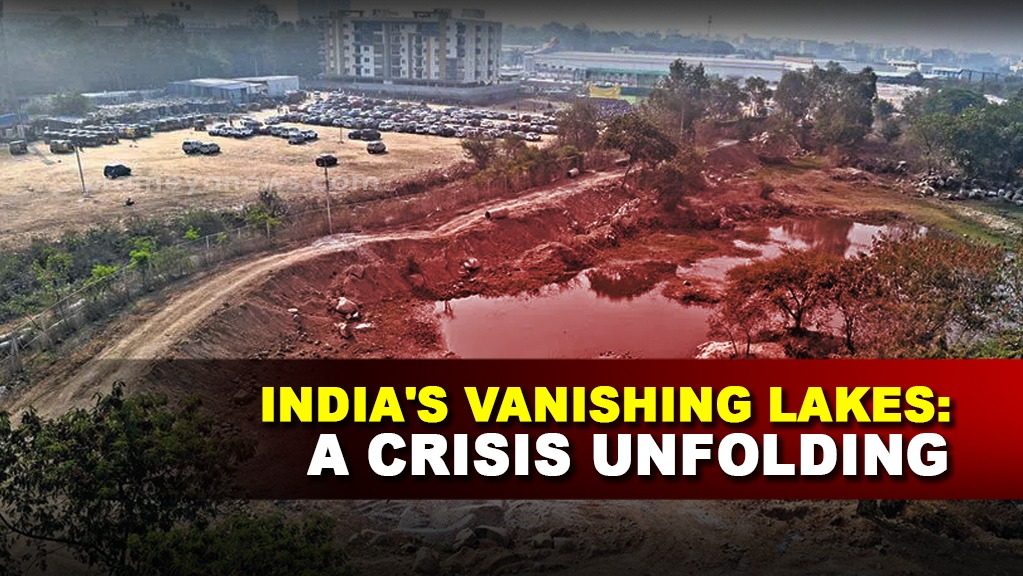India's Vanishing Lakes: A crisis unfolding

Published By : Satya Mohapatra | November 14, 2024 3:37 PM

India, a land of diverse ecosystems and rich biodiversity, is facing a silent crisis: its lakes are disappearing. These vital water bodies, often overlooked in our daily lives, play an indispensable role in sustaining life, regulating our climate, and supporting livelihoods. Yet, over 30 major Indian lakes have shrunk significantly between 1992 and 2020, with a concerning concentration of sixteen in southern India, including critical reservoirs like Mettur and Nagarjuna Sagar. This alarming trend poses a grave threat to our environment, economy, and social well-being.
The intricate web of causes
The reasons behind this crisis are multifaceted and interconnected. Climate change, with its increasingly erratic rainfall patterns and rising temperatures, is a major driving force. Increased evaporation rates, coupled with reduced inflow from shrinking glaciers and altered monsoon patterns, are causing lakes to dry up at an alarming pace.
Furthermore, unsustainable water extraction for agriculture, industry, and domestic use is exacerbating the problem. Over-extraction of groundwater, often to meet the demands of a growing population and expanding agriculture, disrupts the natural recharge of lakes and leads to their gradual decline.
Adding to these challenges, urbanization and land-use changes are altering the landscape around lakes, disrupting their natural drainage patterns and reducing their capacity to capture and store water. Deforestation and encroachment further compound the problem by increasing soil erosion and sedimentation, which reduces the water holding capacity of lakes.
Pollution: A silent killer
Beyond shrinking water levels, pollution poses a significant threat to the health of our lakes. Untreated sewage, agricultural runoff laden with fertilizers and pesticides, and industrial effluents are turning many lakes into toxic hotspots, incapable of supporting aquatic life and posing risks to human health.
Bangalore's Bellandur Lake, infamous for its recurring episodes of frothing and fires due to high pollution levels, serves as a stark reminder of this grim reality. The accumulation of pollutants not only degrades water quality but also disrupts the delicate ecological balance of these ecosystems.
Hope amidst the crisis: The Lake Man of India
Amidst this complex web of challenges, local heroes like Anand Malligavad, the "Lake Man of India," are offering a glimmer of hope. Inspired by the ancient Chola dynasty's sustainable water management techniques, Malligavad has dedicated his life to reviving dying lakes in Bangalore.
His approach is refreshingly simple yet effective. He focuses on restoring the natural ecosystem by strengthening lake beds, restoring canals to prevent water leakage, and creating lagoons to provide safe havens for aquatic life. By replanting native vegetation, he encourages biodiversity and allows the ecosystem to regenerate itself.
Malligavad's success demonstrates that lake restoration is possible with minimal intervention and at a fraction of the cost of building artificial dams. His work has not only revived water bodies but also recharged groundwater levels, improved local microclimates, and fostered community participation in conservation efforts.
A call for collective action
While individual efforts like Malligavad's are commendable, a coordinated response is crucial to address this crisis effectively. Strengthening legal frameworks for lake conservation, promoting sustainable water management practices, and raising public awareness are essential steps towards ensuring the long-term health of our lakes.
Governments, communities, and innovators must join forces to protect these vital ecosystems. Investing in research and development of innovative technologies for lake restoration, such as bioremediation and nanobubble technology, can further enhance our efforts.
Ultimately, saving our lakes is not merely an environmental concern; it is about safeguarding our future. The health of our lakes is intricately linked to our water security, biodiversity, and climate resilience. By recognizing their importance and taking collective action, we can ensure that these life-giving water bodies continue to thrive for generations to come.
DISCLAIMER: This brief is based on information from publicly available sources and reflects the author's interpretation of the topic and do not reflect Prameya's or Prameya News7 editorial stance.











































